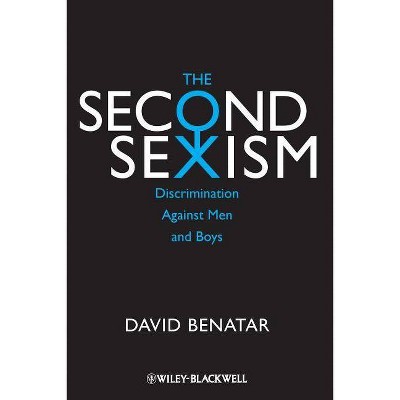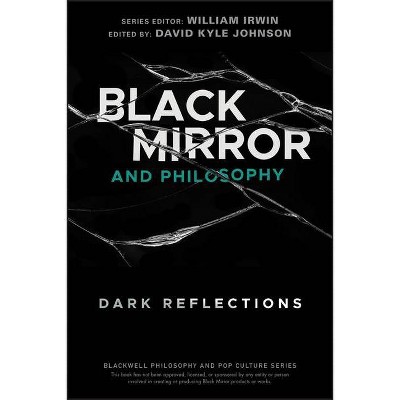The Second Sexism - (Blackwell Public Philosophy) by David Benatar (Paperback)

Similar Products
Products of same category from the store
AllProduct info
<p/><br></br><p><b> Book Synopsis </b></p></br></br><b>Does sexism against men exist? What it looks like and why we need to take it seriously</b> <p>This book draws attention to the second sexism, where it exists, how it works and what it looks like, and responds to those who would deny that it exists. Challenging conventional ways of thinking, it examines controversial issues such as sex-based affirmative action, gender roles, and charges of anti-feminism. The book offers an academically rigorous argument in an accessible style, including the careful use of empirical data, and includes examples and engages in a discussion of how sex discrimination against men and boys also undermines the cause for female equality.</p><p/><br></br><p><b> From the Back Cover </b></p></br></br><p>While the manifestation of sexism against women is widely acknowledged, few people take seriously the idea that males are also the victims of many and quite serious forms of sex discrimination.<br /> <br /> So unrecognized is this form of sexism that the mere mention of it will be laughable to some. Yet women are typically exempt from military conscription even where men are forced into battle and risk injury, emotional repercussions, and death. Males are more often victims of violent crime, as well as of legalized violence such as corporal punishment. Sexual assault of males is often taken less seriously. Fathers are less likely to win custody of their children following divorce.<br /> <br /> In this book, philosophy professor David Benatar provides details of these and other examples of what he calls the "second sexism." He discusses what sexism is, responds to the objections of those who would deny that there is a second sexism, and shows how ignorance of or flippancy about discrimination against males undermines the fight against sex discrimination more generally.</p><p/><br></br><p><b> Review Quotes </b></p></br></br><br><p>"I recommend <i>The Second Sexism</i> to scholars who investigate gender relations, and I urge academic feminists to take Benatar's thesis seriously and to respond to it with respect rather than with disbelief or derision." (<i>American Philosophical Association's Newsletter on Feminism and Philosophy</i>, 1 May 2013)</p> <p>"This book simply must be read . . . . Highly, highly recommended." (<i>Mens News Daily</i>, 4 January 2013)</p> <p>"The Second Sexismis well researched, with voluminous references. As such, it serves the useful function of raising consciousness about an important social issue. Benatar's research makes a strong case for an in-depth examination of the injustices and discriminations that men suffer in this and other societies in the 21st century." (<i>PsycINFO/PsycCRITIQUES</i>, 21 November 2012)</p> "The Second Sexism is a strong and early step on the way to the awareness, amelioration, and treatment of a widespread and unaddressed problem that affects a not insignificant portion of the human population." (<i>New Male Studies Review 3</i>, <i>Jonathan Badiali's</i>, 26 September 2012) <p>"Benatar's analysis brings much needed clarity to contemporary debates in gender studies, whose discourse runs the risk of becoming stagnant and dogmatic against a constantly changing social backdrop. Benatar does well to remind us that it is not only females who are constrained and disadvantaged by the roles that they have been socially encouraged to take up." (<i>New Male Studies Review 2</i>, <i>J.P. Messina's</i>, 26 September 2012)</p> <p>"And now, thanks to Professor Benatar, we have an incisive, comprehensive discussion of the phenomenon that feminism has unwittingly brought to the forefront . . . The writing is jargon-free. As a philosopher, Professor Benatar is attentive to conceptual nuance and clear, precise usage." (<i>New Male Studies Review 1</i>, <i>Miles Groth's</i>, 26 September 2012)</p> <p>"This is a very well-argued book that presents an unorthodox thesis and defends it ably. It would be a useful text in both undergraduate and graduate courses in philosophy and gender studies, where it is certain to arouse a lot of discussion, much of it excited. Since it is very clearly written, and would be interesting and accessible also to the educated layperson. Most importantly, however, it is likely to change our understanding of gender relations." (<i>Metapsychology</i>, 21 August 2012)</p><br><p/><br></br><p><b> About the Author </b></p></br></br><p><b>David Benatar</b> is Professor of Philosophy at the University of Cape Town. He is the author of <i>Better Never to Have Been: The Harm of Coming into Existence</i> (2006).</p>
Price History
Cheapest price in the interval: 32.99 on November 8, 2021
Most expensive price in the interval: 32.99 on December 20, 2021
Price Archive shows prices from various stores, lets you see history and find the cheapest. There is no actual sale on the website. For all support, inquiry and suggestion messages communication@pricearchive.us




















